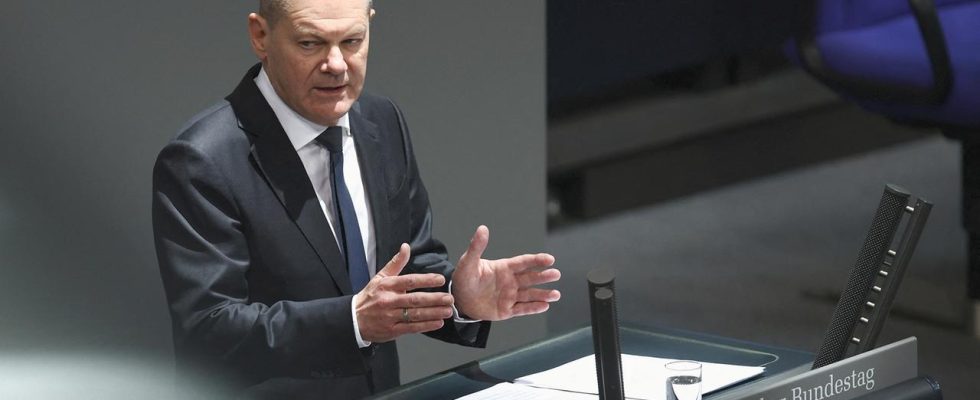analysis
After Mützenich’s statement about “freezing” the Ukraine conflict, Scholz’s appearance in the Bundestag became a balancing act. But perhaps the SPD parliamentary group leader has even done the Chancellor a favor.
How do you position yourself as Chancellor between a peace-loving SPD parliamentary group leader and a defense minister who has just decidedly distanced himself from his own parliamentary group leader on Ukraine policy? In previous government statements, the Scholz party was not the problem for him. He often had to deal with disputes between his coalition between the FDP and the Greens.
Now things are different: For days the political debate has revolved around a single word from the SPD parliamentary group leader Rolf Mützenich. Last week he asked the following question on Ukraine policy at the Bundestag’s lectern: Whether it wasn’t time to not only talk about how to wage a war, “but also to think about how to freeze a war and… “can finish it later”.
“Freezing” – this term prompted SPD Federal Defense Minister Boris Pistorius to respond quite clearly during a trip abroad on Monday: “It would only help Putin in the end.” There should be no dictated peace and “no peace that leads to that – or a ceasefire or a freeze – in which Putin emerges stronger in the end and continues the conflict whenever he pleases,” said Pistorius. Ukraine must continue to be supported “without ifs and buts”.
At least the passage in Olaf Scholz’s government statement was almost written. Scholz also made it clear that Germany is Ukraine’s biggest supporter within Europe, especially when it comes to the country’s defense capabilities. And for as long as she needs it. For this clarification, which is actually not new, he even received thanks from opposition leader and Union parliamentary group leader Friedrich Merz.
Scholz responded with a triad: More and lasting support for Ukraine – now also with international procurement of ammunition, no NATO participation and no “dictated peace”. In his half-hour speech, the Chancellor simply managed not to mention the critical debate points of the past few days: neither the “Taurus” weapons system nor Mützenich’s “freezing”.
In this way he avoided damaging the faction leader, who was extremely popular with SPD MPs. In addition, Scholz will not necessarily have disturbed the debate of the past few days. Especially when it comes to German Ukraine policy, in his opinion, too many people in political Berlin have been asking why more is not being delivered, but too rarely have they asked whether a course of prudence is needed.
In previous traffic light coalition discourses about the right amount or the right weapon system to support Ukraine, Scholz always appeared initially as the hesitant one, and later as the one driven by the FDP and Green defense politicians, for example when he was concerned about the delivery of the “Leopard” battle tank 2″ but decided on it late.
In this respect, Mützenich may have even done him a favor because Scholz was able to present himself today as a doer and clear-speaker and make it clear that not only Germany, but also Europe, is speeding up in supporting the attacked country.
There are always substantive differences in Ukraine policy
Ultimately, the recurring debates on Ukraine policy show the tension in the traffic light coalition in support of Ukraine. It has existed since the beginning of Russia’s war of aggression, which violates international law.
There is a desire, especially among the smaller coalition partners, for more and faster support than Mützenich and those around him in the SPD seemed advisable. Most recently, Agnieszka Brugger from the Greens spoke out in favor of supplying the “Taurus” weapon system, although Scholz had clearly positioned himself against it.
“The debate cannot be ended with Basta”
“The best guarantee for our security is a defeat for Putin, which is also why we support Ukraine,” Brugger said in the Bundestag last week. Hesitation and hesitation can also contribute to escalation. That’s why the “Taurus” debate “cannot be ended with just one piece of shit.” Mützenich’s positioning should also be understood as a response to this.
At least the SPD parliamentary group leader managed to divert public interest away from Scholz and the “Taurus” debate that was annoying him – says someone close to him. Whether this was intentional or a side effect remains unclear.

